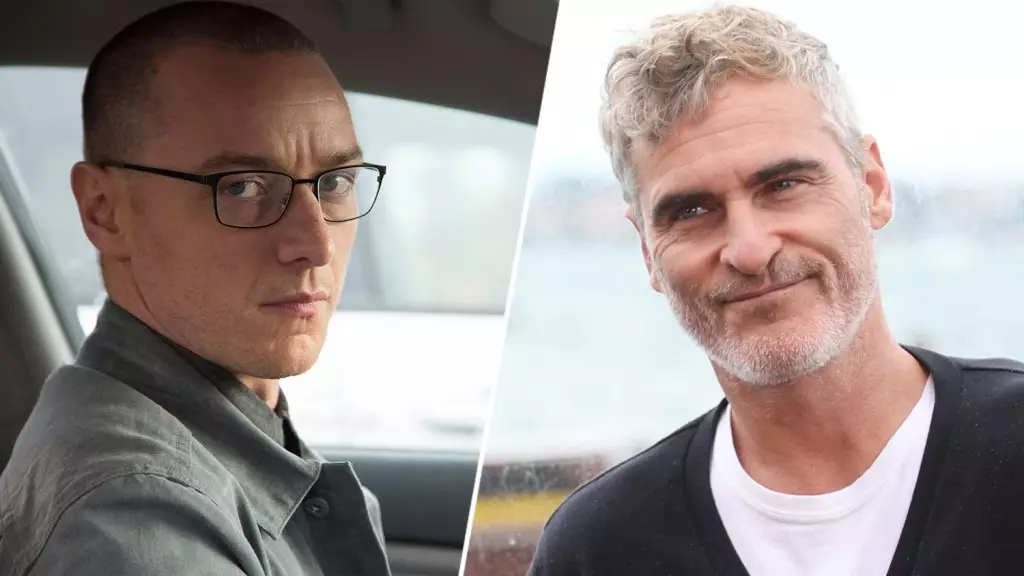The film industry is synonymous with unpredictability. Last-minute changes and sudden exits are part and parcel of the intricate dance between actors, directors, and production teams. The recent discussions involving actors like Joaquin Phoenix and James McAvoy illuminate how such shifts can impact not only the making of a film but also the actors’ careers and creative journeys. Actors are often thrown into rapid preparation periods that can lead to both triumph and disaster, depending on their adaptability and skills. This article delves into a specific instance involving James McAvoy’s last-minute entry into M. Night Shyamalan’s 2016 film *Split*, exploring the emotional, professional, and creative implications of such casting changes.
When James McAvoy received the call to step in for Joaquin Phoenix, who exited the *Split* production just weeks before filming was set to begin, it was a rare opportunity wrapped in immense pressure. According to McAvoy himself, confidence plays a crucial role in an actor’s ability to perform under such circumstances. His remarks during the Happy Sad Confused podcast humorously downplayed the nerves; however, the stakes were undeniably high. McAvoy had a mere two weeks to prepare for the role of Kevin, a complex character riddled with over 20 personalities—including the terrifying identity of “The Beast.” This scenario required not only a deep emotional investment but also a seamless transition into a headspace that one would typically cultivate over a longer preparation period.
McAvoy’s assertion that stepping in last minute can sometimes yield unique results speaks volumes about the unpredictable nature of creativity. While grounding his remarks in humor, it’s clear he holds immense respect for Phoenix’s capability as an actor, acknowledging that their portrayals would differ significantly. The realm of performance art allows for continuous interpretation and reinvention, depending on the actor’s unique perspective and experiences. For the audience, this means that even roles that might seem static can evolve dramatically based on who embodies them.
Taking on Kevin was no simple task; it required McAvoy to tap into varying emotional states and personal histories, all while making each personality distinct. He faced a rigorous yet thrilling challenge as he engaged with the script, acquiring a better grip on his character as the days progressed. His journey mirrors that of many actors who dive headfirst into performances, relying heavily on instinct and improvisation to shape their roles.
Interestingly, McAvoy’s revelations didn’t merely revolve around his experiences with *Split*. He also recounted a prior moment from his career when he opted out of a retention deal for a *Harry Potter* role earlier in his career. Herein lies a cautionary tale about the dichotomy of potential success versus artistic integrity. Although the offer of a substantial sum for the retainer was tempting, McAvoy opted to remain free to pursue other opportunities, which ultimately proved to be a decision grounded in foresight. This grappling between temptation and long-term vision signals the tough choices aspiring actors and even established stars must make.
For McAvoy, the journey of turning down what could have been a significant boost to his career in favor of growth and learning resonates with the philosophical underpinnings of an artist’s journey. His experience highlights that sometimes, missing out on a major project could steer one toward unforeseen opportunities that foster personal and professional development. The essence of acting transcends the roles themselves; it’s also about the process, the lessons learned, and the resilience built along the way.
As demonstrated through McAvoy’s stories, the winding roads of Hollywood are littered with decisions that mold an artist’s trajectory. The dual nature of pressure can either unveil brilliance or lead to stumbles, making every casting change and every audition a unique chapter in an actor’s life. Actors like McAvoy remind us that the craft is as much about risks and rewards as it is about the final performance on screen.

Leave a Reply